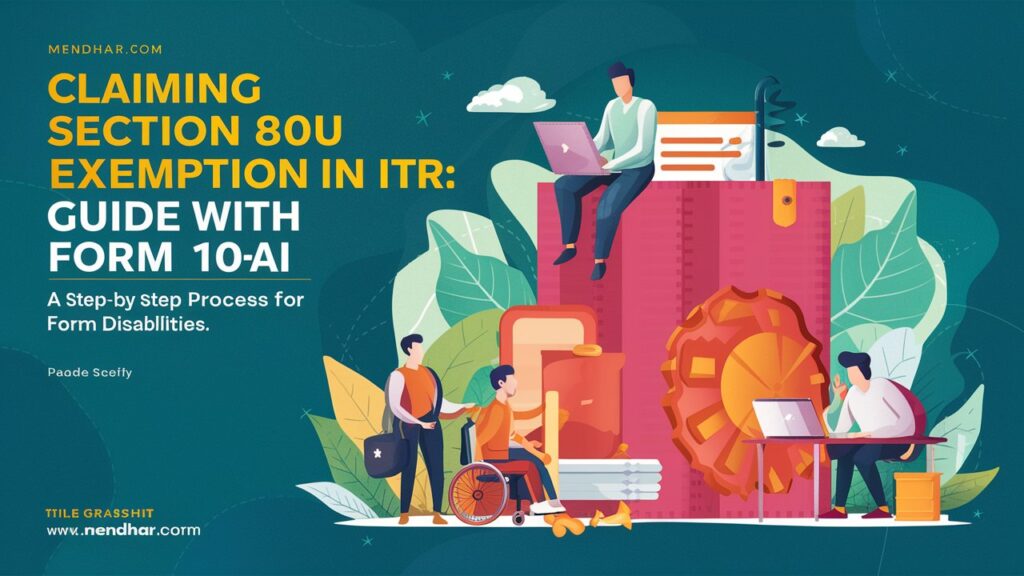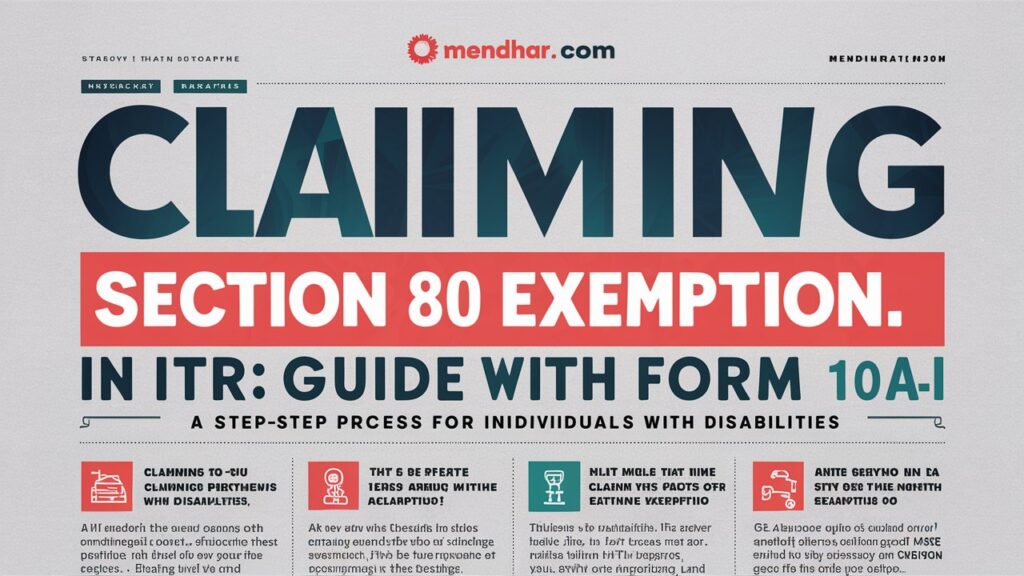Table of Contents
ToggleClaiming Section 80U Exemption in ITR: Guide with Form 10AI

Navigating the complexities of the Indian tax system can be challenging, especially when it comes to claiming exemptions and deductions. With numerous sections and clauses, understanding which benefits apply to you can often feel overwhelming. One of the critical exemptions that taxpayers should be aware of is under Section 80U of the Income Tax Act. This particular section is designed to provide financial relief to individuals with disabilities, acknowledging the additional challenges and expenses they may face. It is essential for eligible taxpayers to be well-informed about this provision to ensure they can take full advantage of the deductions available to them, thereby reducing their taxable income and overall tax burden.
This article aims to provide a detailed guide on claiming Section 80U exemption in ITR: Guide with Form 10AI. By breaking down the process step-by-step, we will help you understand the eligibility criteria, the necessary documentation, and how to accurately include the deduction in your Income Tax Return (ITR). Special attention will be given to Form 10AI, a crucial document in this process, ensuring you know exactly what information it should contain and how to fill it out correctly. Whether you are filing ITR-1, ITR-2, or any other form, this comprehensive guide is designed to make the process straightforward and accessible, helping you navigate the intricacies of the tax system with confidence.
Understanding Section 80U:
Section 80U of the Income Tax Act, 1961, allows individuals with disabilities to claim a deduction from their gross total income. The amount of deduction varies based on the severity of the disability:
- For a person with disability: A fixed deduction of ₹75,000.
- For a person with severe disability: A fixed deduction of ₹1,25,000.
Definitions of Disability and Severe Disability
The Act defines disability as per the Persons with Disabilities (Equal Opportunities, Protection of Rights and Full Participation) Act, 1995, which includes:
- Blindness
- Low vision
- Leprosy-cured
- Hearing impairment
- Locomotor disability
- Mental retardation
- Mental illness
Severe disability refers to a condition where the disability is 80% or more.
Eligibility Criteria:
To claim the deduction under Section 80U, the taxpayer must fulfill specific eligibility criteria designed to ensure that the benefits are provided to those who genuinely need them. Firstly, the individual must be a resident of India. This residency requirement is crucial because the provisions of the Indian Income Tax Act primarily apply to individuals who reside in India for tax purposes. Residency is determined based on the number of days an individual spends in India during a financial year, and it ensures that the tax benefits are appropriately allocated to those who contribute to the Indian economy and are subject to its tax laws.
Secondly, the individual must be certified by a medical authority as having a disability or severe disability. This certification is essential as it serves as official proof of the individual’s condition and the extent of their disability. The medical authority must be recognized and authorized to issue such certifications, ensuring the credibility and accuracy of the diagnosis. Disabilities covered under Section 80U include a range of physical and mental conditions as defined in the Persons with Disabilities (Equal Opportunities, Protection of Rights and Full Participation) Act, 1995. For severe disabilities, where the disability is 80% or more, the certification must explicitly state this to qualify for the higher deduction amount. This stringent requirement helps prevent misuse of the provision and ensures that the benefits are directed towards individuals who face significant challenges due to their disabilities.

Steps to Claim Deduction Under Section 80U in ITR:
1. Obtain a Disability Certificate
The first step in claiming Section 80U exemption in ITR: Guide with Form 10AI is to obtain a certificate from a recognized medical authority certifying the disability. This certificate should detail the nature of the disability and its severity. In case of severe disabilities, the certificate must clearly state that the disability is 80% or more.
2. Fill Form 10AI
Form 10AI is a critical document for claiming Section 80U exemption in ITR: Guide with Form 10AI. This form is a medical certificate that confirms the disability and is issued by a recognized medical authority.
Contents of Form 10AI
- Name and address of the applicant
- Details of the disability: Including the type and percentage of disability.
- Medical authority details: Including the name, designation, and signature of the medical authority along with their official seal.
- Date of issue: The date on which the certificate is issued.
3. Include the Deduction in Your ITR
Once you have the disability certificate and Form 10AI, you can proceed to file your Income Tax Return. Here’s how you can include the deduction:
Filing ITR-1 (Sahaj) or ITR-2
If you are using ITR-1 or ITR-2, you need to fill in the details of the deduction under the relevant section for deductions in the ITR form.
- ITR-1: In Part C – Deductions and Taxable Total Income, under the section ‘80U – Deductions in respect of a person with disability’.
- ITR-2: In Schedule VI-A, under ‘80U – Deduction in case of a person with disability’.
Filing Other ITR Forms
For individuals filing ITR-3, ITR-4, ITR-5, or ITR-6, similar provisions exist under the deductions section of these forms where you can claim the deduction under Section 80U.
4. Attach Supporting Documents
While the Income Tax Department does not require you to attach the disability certificate or Form 10AI with your ITR, it is crucial to retain these documents for your records. In case of any scrutiny or assessment, you may be asked to produce these certificates to substantiate your claim.
Key Points to Remember
- Validity of Certificate: Ensure that your disability certificate is valid for the assessment year for which you are claiming the deduction. Some certificates are issued for a specific period, after which they need to be renewed.
- Permanent Disability: If the disability is permanent and not subject to change, the certificate may state that no reassessment is required.
- Multiple Disabilities: If an individual has multiple disabilities, the percentage of each disability should be aggregated to determine if they qualify for severe disability.
- Verification of Claims: The Income Tax Department may request verification of claims. Therefore, maintaining all related documents in an organized manner is advisable.
Common FAQs on Section 80U Deduction
1. Can a Non-Resident Indian (NRI) claim deduction under Section 80U?
No, the deduction under Section 80U is available only to resident individuals.
2. Is there any age limit for claiming the deduction under Section 80U?
No, there is no age limit for claiming the deduction under Section 80U.
3. Can parents claim deduction under Section 80U for their disabled child?
No, Section 80U is applicable only to the individual with a disability. However, parents can claim a deduction under Section 80DD for medical treatment and maintenance of a disabled dependent.
4. What happens if the disability percentage is less than 40%?
If the disability percentage is less than 40%, the individual is not eligible to claim the deduction under Section 80U.
5. Is the deduction under Section 80U available every year?
Yes, as long as the individual holds a valid disability certificate for each assessment year, the deduction can be claimed annually.
Conclusion:
Claiming the deduction under Section 80U can provide significant tax relief to individuals with disabilities. By understanding the eligibility criteria, obtaining the necessary certifications, and accurately including the deduction in your Income Tax Return, you can ensure that you maximize your tax benefits. Always keep your documents in order and consult with a tax professional if you have any doubts. Claiming Section 80U exemption in ITR: Guide with Form 10AI plays a pivotal role in this process, serving as the official document that validates the claim of disability and facilitates the deduction. By following this guide, you can navigate the process with confidence and ease.


